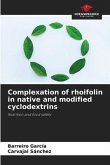Advances in molecular genetics and recombinant protein (rDNA) technology lead to an increasing availability of protein-based biomolecules1. In contrast to conventional low molecular weight synthetic chemical drugs protein drugs provide a relatively high specifity and activity at low concentrations2. Therefore, today protein drugs represent a fast-growing class of therapeutic molecules1,3. Protein-based drugs offer a multitude of new therapeutic options, mainly for the treatment of severe and chronic diseases such as autoimmune or cancer diseases2. However, with the increasing number of ¿new biologic entities¿ passing through development and manufacturing and finally reaching patients, also unprecedented challenges for the design of stable, safe and convenient formulations are encountered4. The first obvious formulation challenge to be faced concerns the delivery of protein drugs. Oral delivery ¿ which is generally the preferred and most widely applied route of drug administration ¿ is not feasible with protein drugs.
Hinweis: Dieser Artikel kann nur an eine deutsche Lieferadresse ausgeliefert werden.
Hinweis: Dieser Artikel kann nur an eine deutsche Lieferadresse ausgeliefert werden.








